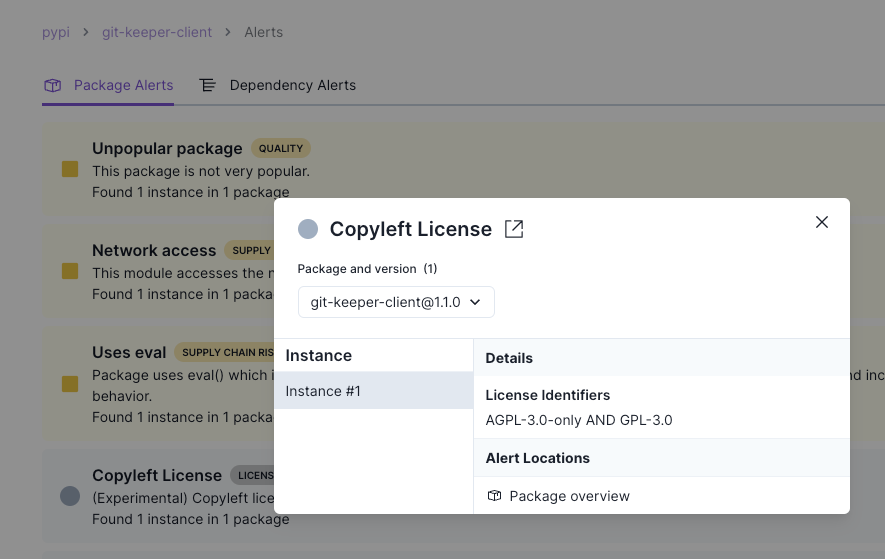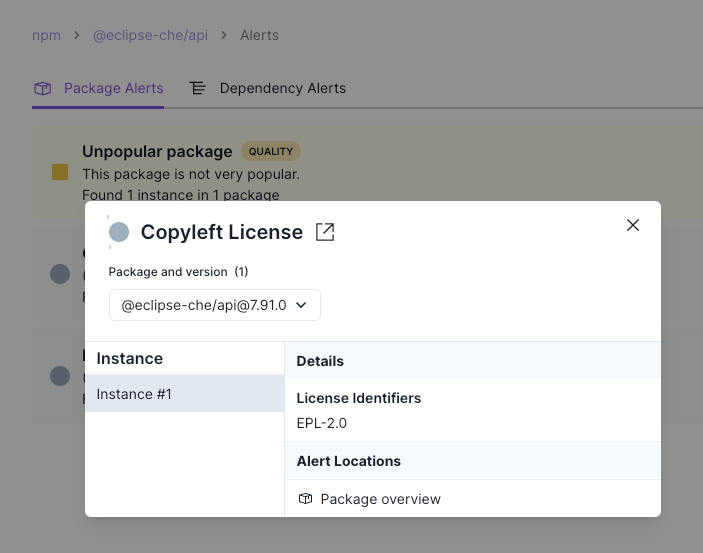Copyleft License
Severity
Low
Short Description
(Experimental) Copyleft license information was found.
Suggestion
Determine whether use of copyleft material works for you
Information
The Copyleft License flags dependencies bearing a copyleft license to help teams quickly identify and address potential licensing conflicts before they become a problem in projects where copyleft licensing could impose incompatible requirements on a project.
It's important to determine early on if copyleft licensing is compatible with your project or if it should be avoided due to legal requirements.
Here are some potential issues with copyleft licensing when a project isn't fully compatible:
- License Incompatibility: Copyleft licenses, like the GPL, require that derivative works also use the same license. This can clash with projects that use more permissive licenses (like MIT or Apache), leading to legal conflicts.
- Distribution Limitations: Projects incorporating copyleft-licensed code might need to distribute their source code under the same license, which can be problematic if the project's policies or business model restrict open distribution.
- Compliance Complexity: Copyleft licenses often have strict requirements, such as providing the source code and license text. Projects not equipped to meet these requirements risk non-compliance, potentially leading to legal issues.
- Reluctance to Use: Some businesses and developers avoid copyleft-licensed software to prevent licensing restrictions on their own proprietary code, limiting collaboration opportunities.
- Unforeseen Legal Risks: If a project inadvertently incorporates copyleft software without understanding the full implications, it could lead to unexpected legal and compliance headaches, especially for commercial projects.
These complexities highlight the importance of understanding and managing copyleft licensing within a project at the earliest stages of development.
Recommended actions
When you get this alert on a dependency, your course of action will be determined by project’s requirements, legal constraints, and how comfortable you are with the obligations imposed by the copyleft license.
1. Review the License Terms:
- Carefully read the specific copyleft license (e.g., GPL, LGPL, AGPL) of the flagged dependency. Each copyleft license has different requirements on how you can use, modify, and distribute the software.
2. Assess Compatibility with Your Project:
- Determine if the copyleft license is compatible with your project's licensing and distribution model. For example, some copyleft licenses may require you to make your project’s source code available if you distribute the software.
3. Consult Legal Guidance:
- If you are unsure about how the copyleft license impacts your project, consult with your organization's legal team or a lawyer familiar with open-source licenses to understand the implications fully.
4. Replace the Dependency:
- If the copyleft license poses a risk, consider finding an alternative package with a more permissive license (e.g., MIT, Apache 2.0).
5. Isolate the Copyleft Dependency:
- If you must use the copyleft-licensed dependency, consider isolating it to limit its scope within your project. For instance, using it in a separate module or service can help avoid spreading its license obligations to the entire codebase.
6. Comply with License Requirements:
- If using the copyleft dependency is necessary, ensure you comply with its licensing requirements, such as providing attribution, making source code changes available, or including the license text with your software distribution.
7. Monitor Future Updates:
- Keep track of any updates to the dependency and re-evaluate the license with each new version. Socket's alerts can help you stay informed about any changes in licensing terms.
Examples
Here's a few examples of software with copyleft licenses flagged by Socket's alert:


Detection Method
The Copyleft License alert flags packages that identify a copyleft license in their package.json file. This includes both strong GNU licenses (GPL, LGPL, AGPL) and weaker copyleft licenses (e.g. MPL, EPL).
Packages with this alert contain license data indicating that some portion of the package is offered ONLY under a copyleft license. If a given package is offered under a choice of more than one license and any combination of those can avoid copyleft, this alert will not be emitted.
Additional resources
GNU - What is Copyleft? This page on GNU's website provides a thorough explanation of copyleft, covering its history, how it works, and its importance in the free software movement. It’s a valuable resource for understanding copyleft's nuances.
Software Freedom Conservancy - The Principles of Community-Oriented GPL Enforcement
Open Source Initiative (OSI) - Licensing & Compliance: OSI offers an overview of various open-source licenses, including copyleft licenses, and provides resources for understanding licensing compliance.
Developer Accuses Tencent of Copyright Violation After Python Utility’s License Changed from GPLv3 to BSD - This situation highlights the importance of detecting copyleft licensing early on in your project before it becomes painful to remove from your codebase.